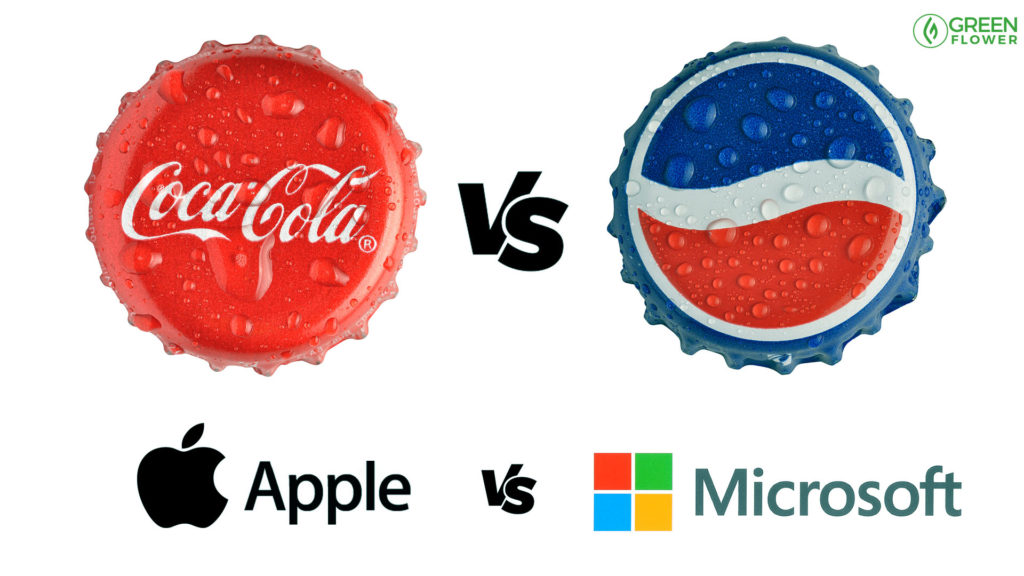Your brand’s personality is the combination of qualities that form its distinctive, almost human character. But brand personality goes beyond how your brand looks and speaks — though that is part of the equation. Personality is how your brand acts, what causes it rallies around, and how it engages with consumers, the outside world, and other businesses. In one oversimplified word, it’s how you “relate” to the customer.
Why Brand Personality Matters In Cannabis
In today’s emerging marketplace, consumers have a myriad of choices. And just like the most established supermarkets, department and chain stores, every dispensary in America is jam-packed with different brands jockeying for consumer attention. That’s why cultivating a strong brand personality is crucial if you want your business to stand out — before mass consumer loyalty is truly established in our fragmented industry.

Coke & Pepsi, Target & Walmart, Apple & Microsoft
Think about some of your favorite brands. Do they have direct competitors? Can you think of a few reasons why you choose your favorites over their competition?
As a cannabis brand, if you want to differentiate yourself from your competitors and turn prospects into loyal customers, you need a great product or service alongside a distinctive and consistent voice across all channels.
In this article, we’ll share some tips that will help you develop your brand’s unique personality.
5 Tips For Developing Your Cannabis Brand’s Personality
1. Begin With Your Mission Statement, Vision, & Values
Take a long hard look at your brand’s mission, vision, and values.
Mission/Vision
The mission clearly states “what your company does” while the vision refers to “what your company wants to achieve.” Keep in mind that you may need to adjust your mission and vision over time to reflect the changes in external or internal environments.
A worthwhile vision will stretch your company by defining an ambitious but attainable future state.
Values
Your company’s values include items like how managers and employees should conduct themselves and how they should do business. They help you figure out what kind of organization you need to build to achieve your company’s mission. Defining these values will help shape your brand’s tone and voice.
Look to your values as a true north when deciding how to draft communications, handle interactions, and present your brand’s personality.
2. Define Your Target Audience
Your customers should be able to see themselves or who they aspire to be a little more clearly when they think about your product.
Consider who you want to attract with your campaigns, products, and services. Don’t say “everyone.” Get specific. “A first-time shopper looking for a cannabis product to ease joint pain, so they can still walk 18 holes on the golf course, is probably not the target audience for a new line of live resin.” Defining your target audience doesn’t mean other people won’t gravitate toward your brand, it just means you will have a clear picture in your mind when you are crafting messaging for your company or telling your brand’s story.
Here are some questions to get you on the path to defining your target audience:
- What do they care about?
- What problems do they have that your business solves best?
- What visual and cultural messages are they familiar with?
- What traits do they share?
- How do they speak?
- Do they use social media?
- What in-jokes do they understand that nobody else gets?
- How do they use and relate to your product(s)?
When you have a better idea of how your target audience thinks and acts, you will be able to craft communications that resonate with them on a deeper level that’s more impactful.
3. Sit Down & Chart The Adjectives That Best Describe Your Brand
Customers can’t be expected to figure out what your brand is all about if you can’t define it. One of the best ways to do this is by writing words on post-it notes, then grouping similar words together. When creating your groupings, be mindful of common attributes or themes that repeat themselves.
Narrow your groupings down to the four piles that best describe your brand. Then, from each pile, choose the word that best personifies your business.
After you have your four adjectives, write a blurb for each describing why this word embodies a trait of your brand.
4. Make A List Of Brands You Admire
Once you have your list of brands, get granular with the reasons they made your list. Is it their tone of voice? Are you drawn to the colors they use? Their use of imagery? Maybe it’s their font choice? All these things play a part in presenting their overall personality.
How do these small pieces reflect on the brand as a whole?
5. Make A List Of Your Direct Competitors
“Be yourself; everyone else is already taken.” ― Oscar Wilde.
Your cannabis brand does not exist in a vacuum. It exists relative to your next potential customer’s wide assortment of options. You don’t want to sound or look the same as another brand, especially if they are in direct competition on the shelf.
When brands are too similar, it creates confusion for customers. You don’t want someone to purchase a competitor’s product by mistake. And tricking someone into buying your product by mistake is not a path to sustainable growth.
It’s alright to have things in common with your competitors, but your personality should be unique. Look to your business’ unique selling proposition to help inspire ways your business can stand apart from competitors.

Consistency Is Key
Crafting a brand personality is just the beginning. Your brand’s personality needs to remain consistent and radiate from all touch points.
Copy on your marketing material, packaging, website, and social channels should feel like it’s coming from one voice. If it doesn’t, your brand will come off as sloppy or disingenuous, damaging your credibility over time.
But if you put in the time and effort, and remain committed to why your brand exists in the first place, your brand’s personality will transform into a unique asset you can leverage for a very long time.
Need help navigating the world of cannabis branding?
Check out our Cannabis Business Essentials certificate program.
You’ll learn the art of branding from the founder of one of the cannabis industry’s most successful branding agencies. Avoid costly mistakes in marketing, finance, lab-testing, licensing, distribution, and much more through 14 insightful courses taught by industry-leading experts from every sector of the cannabis industry.

